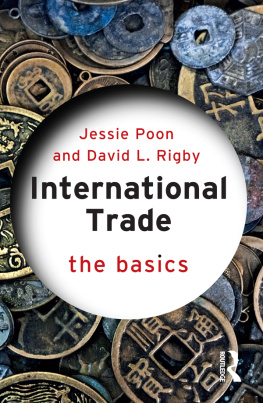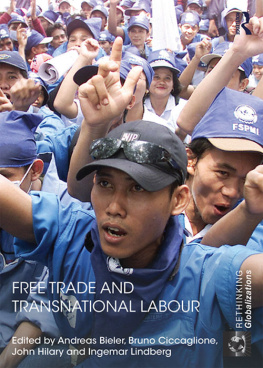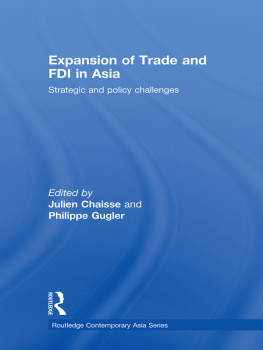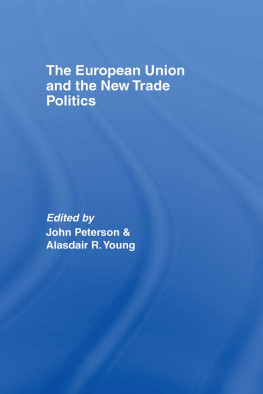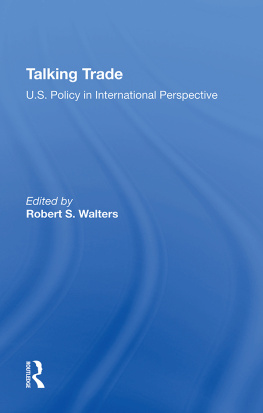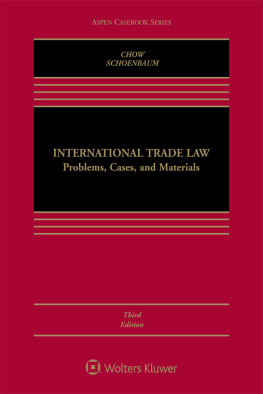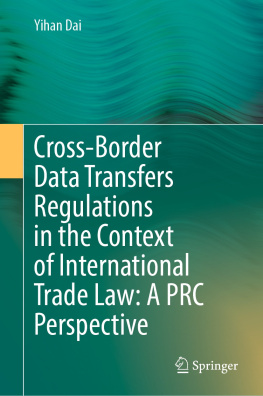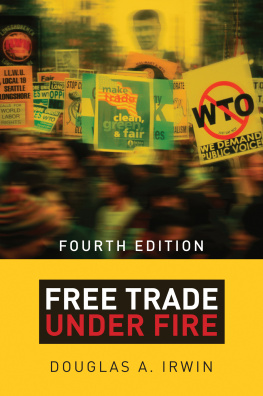First published 2017
by Routledge
2 Park Square, Milton Park, Abingdon, Oxon OX14 4RN
and by Routledge
711 Third Avenue, New York, NY 10017
Routledge is an imprint of the Taylor & Francis Group, an informa business
2017 Jessie Poon and David L. Rigby
The right of Jessie Poon and David L. Rigby to be identified as authors of this work has been asserted by them in accordance with sections 77 and 78 of the Copyright, Designs and Patents Act 1988.
All rights reserved. No part of this book may be reprinted or reproduced or utilised in any form or by any electronic, mechanical, or other means, now known or hereafter invented, including photocopying and recording, or in any information storage or retrieval system, without permission in writing from the publishers.
Trademark notice: Product or corporate names may be trademarks or registered trademarks, and are used only for identification and explanation without intent to infringe.
British Library Cataloguing in Publication Data
A catalogue record for this book is available from the British Library
Library of Congress Cataloging in Publication Data
Names: Poon, Jessie P. H., 1963 author. | Rigby, David L., author.
Title: International trade: the basics / Jessie Poon and David L. Rigby.
Description: Abingdon, Oxon; New York, NY: Routledge, 2017. | Includes
bibliographical references and index.
Identifiers: LCCN 2016039172 | ISBN 9781138824386 (hardback) |
ISBN 9781138824393 (pbk.) | ISBN 9781315740683 (ebook)
Subjects: LCSH: International trade.
Classification: LCC HF1379.P6635 2017 | DDC 382dc23
LC record available at https://lccn.loc.gov/2016039172
ISBN: 978-1-138-82438-6 (hbk)
ISBN: 978-1-138-82439-3 (pbk)
ISBN: 978-1-315-74068-3 (ebk)
Typeset in Bembo
by Keystroke, Station Road, Codsall, Wolverhampton

THE BASICS
For a full list of titles in this series, please visit www.routledge.com/The-Basics/book-series/B
ANIMAL ETHICS
TONY MILLIGAN
ANTHROPOLOGY OF RELIGION
JAMES S. BIELO
ARCHAEOLOGY (SECOND EDITION)
CLIVE GAMBLE
THE BIBLE AND LITERATURE
NORMAN W. JONES
BRITISH POLITICS
BILL JONES
CAPITALISM
DAVID COATES
CHRISTIAN THEOLOGY
MURRAY RAE
FINANCE (THIRD EDITION)
ERIK BANKS
FORENSIC PSYCHOLOGY
SANDIE TAYLOR
JAPAN
CHRISTOPHER P. HOOD
LANGUAGE (SECOND EDITION)
R.L. TRASK
NARRATIVE
BRONWEN THOMAS
POETRY (THIRD EDITION)
JEFFREY WAINWRIGHT
THE QURAN (SECOND EDITION)
MASSIMO CAMPANINI
SPECIAL EDUCATIONAL NEEDS AND DISABILITY (SECOND EDITION)
JANICE WEARMOUTH
SPORT MANAGEMENT
ROBERT WILSON AND MARK PIEKARZ
Contents
Guide
Absolute advantage: The country that can produce a commodity most efficiently is said to have an absolute advantage in the production of that commodity. Absolute advantage was the basis for free trade according to Adam Smith.
Absolute advantage: The country that can produce a commodity most efficiently is said to have an absolute advantage in the production of that commodity. Absolute advantage was the basis for free trade according to Adam Smith.
Absorptive capacity: The ability of firms and countries to identify technological opportunities and leverage those opportunities productively.
Absorptive capacity: The ability of firms and countries to identify technological opportunities and leverage those opportunities productively.
AFTA (ASEAN free trade area): A free trade area in Southeast Asia comprising the countries of Brunei Darussalam, Cambodia, Indonesia, Laos, Malaysia, Myanmar, the Philippines, Singapore, Thailand and Vietnam.
AFTA (ASEAN free trade area): A free trade area in Southeast Asia comprising the countries of Brunei Darussalam, Cambodia, Indonesia, Laos, Malaysia, Myanmar, the Philippines, Singapore, Thailand and Vietnam.
APEC: Asia-Pacific Economic Cooperation. An organization consisting of twenty-one countries around the Asia-Pacific ocean whose mission is to enhance trade and economic prosperity in the region.
APEC: Asia-Pacific Economic Cooperation. An organization consisting of twenty-one countries around the Asia-Pacific ocean whose mission is to enhance trade and economic prosperity in the region.
Bilateralism: The political, economic, trading and cultural relationship of two countries.
Bilateralism: The political, economic, trading and cultural relationship of two countries.
Biosecurity: Surveillance and preventive measures to control the spread of biological organisms (e.g. microbes, bacteria, virus) and diseases to plants, agriculture, livestock and also human health.
Biosecurity: Surveillance and preventive measures to control the spread of biological organisms (e.g. microbes, bacteria, virus) and diseases to plants, agriculture, livestock and also human health.
Cap and trade: A market-based system designed to reduce pollution by providing incentives for members to lower greenhouse gas (GHG) emissions. The cap limits total GHG emissions allowed over some period, and members may trade emissions credits with one another.
Cap and trade: A market-based system designed to reduce pollution by providing incentives for members to lower greenhouse gas (GHG) emissions. The cap limits total GHG emissions allowed over some period, and members may trade emissions credits with one another.
Comparative advantage: Comparative advantage exists when the opportunity costs of producing commodities vary between countries. Even if one country has an absolute advantage in producing all commodities compared with a second country, these nations can still benefit from trade if there are differences between the countries in the relative efficiency with which they can produce different commodities. Countries can benefit from free trade if they export commodities in which they have the largest relative efficiency advantage and import commodities in which they have the smallest relative efficiency advantage.
Comparative advantage: Comparative advantage exists when the opportunity costs of producing commodities vary between countries. Even if one country has an absolute advantage in producing all commodities compared with a second country, these nations can still benefit from trade if there are differences between the countries in the relative efficiency with which they can produce different commodities. Countries can benefit from free trade if they export commodities in which they have the largest relative efficiency advantage and import commodities in which they have the smallest relative efficiency advantage.
Constructivism: A theory of institutionalism that views the development of pan-regional institutions as arising from the social interactions of economic agents and the latters learning effects.
Constructivism: A theory of institutionalism that views the development of pan-regional institutions as arising from the social interactions of economic agents and the latters learning effects.
Coreperiphery: Describes the hierarchical structure of the world economy where the concentration of trade benefits, and thereby economic power, lies in industrial centers (core). Developing countries on the periphery, on the other hand, produce food and raw materials for industrial centers. Technical progress at the industrial centers helps their population to sustain itself. But the inability of developing countries to share in the benefits of technical progress at the core keeps them spatially embedded at the periphery.

